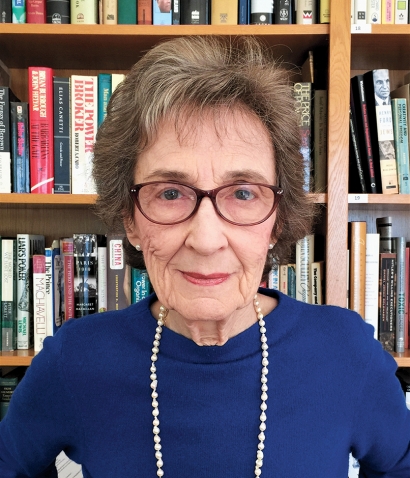In the 1950s, Jean Lipman-Blumen ’54 meandered through Wellesley’s vast meadows alongside Eleanor Roosevelt and into its Gothic academic halls with Madame Chiang Kai-shek (Mayling Soong Chiang, class of 1917).
As a reporter for the Wellesley News, Jean was documenting visits the leaders made to campus. During Roosevelt’s in 1953, a photographer snapped a shot of the 5-foot-4-inch Jean next to the nearly 6-foot-tall Roosevelt. “I’m looking up at her like I’m looking up at Mount Rushmore,” she says.
The encounters were an early hint at her career as an organizational psychologist, professor, and business founder whose core interest lies in leadership. The now 84-year-old still teaches two graduate courses at Claremont Graduate University in California, works full time at the Connective Leadership Institute—her leadership development and public-policy research firm—and travels the world to talk about leadership.
She’s published more than 200 articles on leadership, organizational behavior, and crisis management, and seven books; one was nominated for a Pulitzer. In the last decade, she has focused on the topic of toxic leaders—why followers tolerate them and how to unseat them—and their more desirable alternative, connective leaders.
“I’m getting calls about this from all over the world,” she says. “We’re in an era of toxic leadership.” Fear propels toxic leaders to take hold, and “when people feel uncertain, they’re vulnerable to leaders who say ‘I can take care of it. I can keep you safe,’” she says.
Toxic leaders stifle criticism and often mislead followers while convincing them to hate or destroy others, she adds. “It’s so easy and quick to slip from a democratic structure into one that’s very authoritarian.” It’s a lesson she makes sure students in her toxic leadership course take to heart, as they delve into real-life examples ranging from Philippine President Rodrigo Duterte and Venezuelan leader Nicolás Maduro to corporate leaders.
Jean got into academia early. In her hometown of Newton, Mass., she tested into preschool at age three at her own request; she was bored staying home after her sister went to school. “My mother, who missed out on the chance to go to Wellesley, always thought I’d go,” she says. “It was a dangerous thought. What if I didn’t get in?” But she did. And later, her daughters—Lorna Blumen ’76 and Lesley Blumen Macherelli ’80—attended Wellesley as well.
Jean majored in English, minored in biblical history, and was editor of the Wellesley News and the college’s poetry magazine. She later returned to the College to earn Wellesley’s only master’s in sociology—the College offered master’s degrees in select departments from 1882 to 1979—and went on to earn a Ph.D. in social relations at Harvard while raising three young children. She later served as special advisor to the domestic policy staff in the White House under President Carter. She feels at home in academia, yet calls herself “the accidental professor.” At Wellesley, she thought she’d be a poet.
Jean cares about transforming the world. To do that, “we have to encourage leaders who focus on the good of the group rather than on money or their own fame.” Mahatma Gandhi, Martin Luther King Jr., and Nelson Mandela exemplify those types of leaders. We should be wary of leaders who elbow their way to the front of the line to take charge, she says. “That’s the last person we should endow with leadership responsibilities,” she adds. “It’s not about individual accomplishments. It’s about selflessness and dedication to a larger cause. It’s about the world, and making it a better place for future generations.”








We ask that those who engage in Wellesley magazine's online community act with honesty, integrity, and respect. (Remember the honor code, alums?) We reserve the right to remove comments by impersonators or comments that are not civil and relevant to the subject at hand. By posting here, you are permitting Wellesley magazine to edit and republish your comment in all media. Please remember that all posts are public.